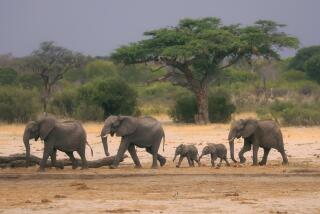Thailand Becoming a Paradise Lost : Nature: Poverty, corruption and development are ruining nation’s once Eden-like parks and protected areas.
- Share via
KHAO SAM ROI YOT, Thailand — It was the sea-washed rim of a tropical Eden: jagged limestone hills, lush mangroves and marshes, cliffs that plunged into waters teeming with life.
Thousands of migrating birds found a haven in Khao Sam Roi Yot, the Mountain of Three Hundred Peaks. Leopards prowled the thickets. The serow, a nimble, noble goat-antelope, scampered on limestone ledges.
In 1966, it was recognized as an internationally important conservation area and designated as a 38-square-mile national park.
Today, a hike up Red Mountain provides a 360-degree vista of destruction. Mangroves gave way to shrimp farms, Thailand’s largest freshwater marsh is being drained for rice farming and rarely is a serow or leopard seen.
National parks and other protected areas, vestiges of a natural paradise, are under unremitting siege all over Thailand. Authorities either take part in the destruction or cannot stop it.
Golf courses have intruded into Khao Yai National Park, which has some of the largest areas of seasonal tropical forest left on mainland Asia.
Hill tribes continue denuding Doi Inthanon, site of Thailand’s highest mountain and home to 40% of the country’s more than 900 bird species. Large hotels have risen on the coral-fringed island of Phi Phi, violating national park regulations.
Before World War II, more than 70% of Thailand was forest. Elephant, tiger, gaur and myriad other species ranged freely.
Khao Yai, the first national park, was established in 1962 because of a wholesale assault on the natural habitat. It has been joined by 62 other parks and 32 wildlife sanctuaries covering more than 11 percent of Thailand, a larger percentage than in the United States, France, Japan or most developing nations.
Up to 100 parks may exist by the end of the decade, but the degradation of existing ones bodes ill for the system’s future.
“There is almost no local awareness,” said Surachet Chettamart, an expert on national parks at Kasetsart University. “Local people want to take as much as possible from the parks, not realizing the long-range benefits to themselves.”
He and other Thai social scientists are aware that poverty forces peasants to fell trees, poach animals and destroy coral beds.
A study by the university said: “Illegal activities are often a collaborative effort among rich and poor, such as a business executive paying a villager to collect orchids or timber. But poor villagers may be responsible for the largest proportion of illegal activities because of economic necessity and lack of alternative income sources.”
Surachet said it is essential that the government improve the lot of villagers and apply enough pressure to stop exploitation of the parks by provincial politicians and businessmen.
Exploiters appear to have won at Khao Sam Roi Yot, along the Gulf of Thailand about 200 miles southwest of Bangkok. Knowledgeable sources said local Thai-Chinese businessmen allied with provincial politicians had enough clout to encroach on the park until, in practical effect, it was destroyed.
Conservationists attach some hope to a growing awareness of the environment among educated Thais, media and public servants like Narong.
Many park rangers also have stood their ground, although poorly paid, ill-equipped and often short on support from superiors. More than 40 have been slain in the line of duty.
Sueb Nakhasathien, chief of the Huai Kha Khaeng Wildlife Sanctuary, spoke out against both the exploiters and his own bosses.
Feeling powerless and defeated, he committed suicide a year ago. Since then, his pleas for the wilderness have become rallying cries for environmentalists.
More to Read
Sign up for Essential California
The most important California stories and recommendations in your inbox every morning.
You may occasionally receive promotional content from the Los Angeles Times.













